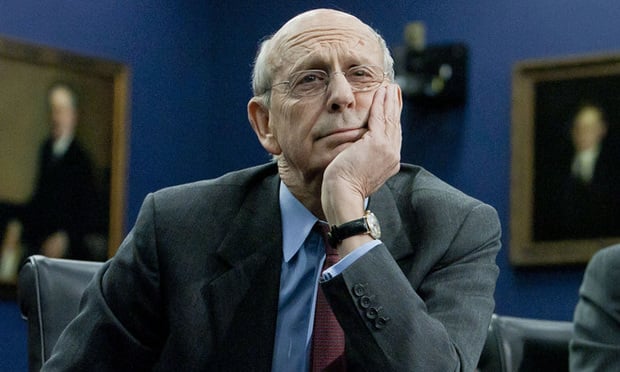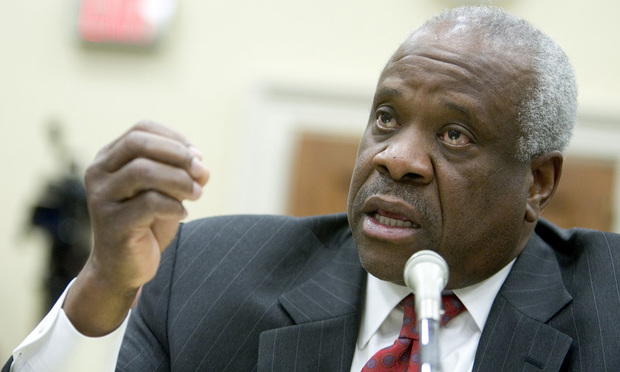Breyer Denounces Ruling That Strikes Precedent, Questions Which Cases Are Next
Justice Stephen Breyer accuses his colleagues of encouraging lawyers to challenge settled law. His dissent came in a case Monday that struck down 40-year-old precedent.
May 13, 2019 at 12:11 PM
4 minute read
 Justice Stephen Breyer testifying in 2015. Photo: Diego M. Radzinschi/NLJ
Justice Stephen Breyer testifying in 2015. Photo: Diego M. Radzinschi/NLJ
U.S. Supreme Court Justice Stephen Breyer on Monday warned that his colleagues may be poised to overturn court precedents in upcoming cases in ways that will sow “increased uncertainty” about the court's consistency.
Joined by liberal colleagues Ruth Bader Ginsburg, Sonia Sotomayor and Elena Kagan, Breyer dissented in Franchise Tax Board of California v. Hyatt, a state sovereignty case in which the 5-4 majority explicitly overturned a 40-year-old precedent, Nevada v. Hall.
The California case is one of at least four in which the court is being asked to overturn precedents this term.
“Each time the court overrules a case, the court produces increased uncertainty,” Breyer wrote. “To overrule a sound decision like Hall is to encourage litigants to seek to overrule other cases; it is to make it more difficult for lawyers to refrain from challenging settled law; and it is to cause the public to become increasingly uncertain about which cases the court will overrule and which cases are here to stay.”
Breyer added, “Today's decision can only cause one to wonder which cases the court will overrule next.” Other pending cases that challenge precedents include Gamble v. United States, a double jeopardy dispute; Knick v. Township of Scott, a takings case; and Kisor v. Wilkie, a regulatory deference case.
Justice Clarence Thomas, who has displayed more willingness to overturn precedent than any other member of the court, wrote the majority opinion, joined by Chief Justice John Roberts Jr. and justices Samuel Alito Jr., Neil Gorsuch and Brett Kavanaugh.
In a two-page defense of overturning precedents in his majority opinion, Thomas asserted that stare decisis, the doctrine that favors preserving precedents, is “not an inexorable command.” The Hall case, Thomas wrote, “stands as an outlier in our sovereign immunity jurisprudence, particularly when compared to more recent decisions.” He added, “Nevada v. Hall is irreconcilable with our constitutional structure.”
 Justice Clarence Thomas (2015). Photo: Diego M. Radzinschi/ALM
Justice Clarence Thomas (2015). Photo: Diego M. Radzinschi/ALMAt issue in the case, which has been before the court three times, is whether states are immune from being sued in the courts of another state. By a 5-4 vote, the 1979 Nevada precedent ruled that the Constitution does not prohibit suits brought by an individual against a state in the courts of another state.
Kate Shaw, professor at Yeshiva University Benjamin N. Cardozo School of Law, said of the decision Monday, “Justice Thomas has very little use for stare decisis; more surprising is that none of the other members of the majority—in particular the Chief Justice—wrote separately on this point. In light of that, I think the ominous tone Justice Breyer strikes at the end of his dissent is quite justified.”
At a Heritage Foundation and Bradley Foundation panel discussion last week, Kirkland & Ellis partner Paul Clement, a former U.S. solicitor general, said of the pending challenges targeting precedents, “I think which one they decide to overrule and why that one and not the others and what the various justices say about that I think will be profoundly important in terms of measuring the trajectory of the court going forward.”
The court's ruling in Franchise Tax Board of California v. Hyatt is posted below:
Read more:
Justice Kavanaugh Raises Questions About Overruling Precedent
Clarence Thomas Stirs Up a First Amendment Squabble Over Libel Law
Dozens of Class Actions Build on Supreme Court's 'Janus' Union Ruling
This content has been archived. It is available through our partners, LexisNexis® and Bloomberg Law.
To view this content, please continue to their sites.
Not a Lexis Subscriber?
Subscribe Now
Not a Bloomberg Law Subscriber?
Subscribe Now
NOT FOR REPRINT
© 2025 ALM Global, LLC, All Rights Reserved. Request academic re-use from www.copyright.com. All other uses, submit a request to [email protected]. For more information visit Asset & Logo Licensing.
You Might Like
View All
Federal Judge Pauses Trump Funding Freeze as Democratic AGs Plan Suit
4 minute read
4th Circuit Upholds Virginia Law Restricting Online Court Records Access
3 minute read
'Religious Discrimination'?: 4th Circuit Revives Challenge to Employer Vaccine Mandate
2 minute read
4th Circuit Revives Racial Harassment Lawsuit Against North Carolina School District
3 minute readTrending Stories
- 1'Reverse Robin Hood': Capital One Swarmed With Class Actions Alleging Theft of Influencer Commissions in January
- 2Hawaii wildfire victims spared from testifying after last-minute deal over $4B settlement
- 3How We Won It: Latham Secures Back-to-Back ITC Patent Wins for California Companies
- 4Meta agrees to pay $25 million to settle lawsuit from Trump after Jan. 6 suspension
- 5Stevens & Lee Hires Ex-Middle District of Pennsylvania U.S. Attorney as White-Collar Co-Chair
Who Got The Work
J. Brugh Lower of Gibbons has entered an appearance for industrial equipment supplier Devco Corporation in a pending trademark infringement lawsuit. The suit, accusing the defendant of selling knock-off Graco products, was filed Dec. 18 in New Jersey District Court by Rivkin Radler on behalf of Graco Inc. and Graco Minnesota. The case, assigned to U.S. District Judge Zahid N. Quraishi, is 3:24-cv-11294, Graco Inc. et al v. Devco Corporation.
Who Got The Work
Rebecca Maller-Stein and Kent A. Yalowitz of Arnold & Porter Kaye Scholer have entered their appearances for Hanaco Venture Capital and its executives, Lior Prosor and David Frankel, in a pending securities lawsuit. The action, filed on Dec. 24 in New York Southern District Court by Zell, Aron & Co. on behalf of Goldeneye Advisors, accuses the defendants of negligently and fraudulently managing the plaintiff's $1 million investment. The case, assigned to U.S. District Judge Vernon S. Broderick, is 1:24-cv-09918, Goldeneye Advisors, LLC v. Hanaco Venture Capital, Ltd. et al.
Who Got The Work
Attorneys from A&O Shearman has stepped in as defense counsel for Toronto-Dominion Bank and other defendants in a pending securities class action. The suit, filed Dec. 11 in New York Southern District Court by Bleichmar Fonti & Auld, accuses the defendants of concealing the bank's 'pervasive' deficiencies in regards to its compliance with the Bank Secrecy Act and the quality of its anti-money laundering controls. The case, assigned to U.S. District Judge Arun Subramanian, is 1:24-cv-09445, Gonzalez v. The Toronto-Dominion Bank et al.
Who Got The Work
Crown Castle International, a Pennsylvania company providing shared communications infrastructure, has turned to Luke D. Wolf of Gordon Rees Scully Mansukhani to fend off a pending breach-of-contract lawsuit. The court action, filed Nov. 25 in Michigan Eastern District Court by Hooper Hathaway PC on behalf of The Town Residences LLC, accuses Crown Castle of failing to transfer approximately $30,000 in utility payments from T-Mobile in breach of a roof-top lease and assignment agreement. The case, assigned to U.S. District Judge Susan K. Declercq, is 2:24-cv-13131, The Town Residences LLC v. T-Mobile US, Inc. et al.
Who Got The Work
Wilfred P. Coronato and Daniel M. Schwartz of McCarter & English have stepped in as defense counsel to Electrolux Home Products Inc. in a pending product liability lawsuit. The court action, filed Nov. 26 in New York Eastern District Court by Poulos Lopiccolo PC and Nagel Rice LLP on behalf of David Stern, alleges that the defendant's refrigerators’ drawers and shelving repeatedly break and fall apart within months after purchase. The case, assigned to U.S. District Judge Joan M. Azrack, is 2:24-cv-08204, Stern v. Electrolux Home Products, Inc.
Featured Firms
Law Offices of Gary Martin Hays & Associates, P.C.
(470) 294-1674
Law Offices of Mark E. Salomone
(857) 444-6468
Smith & Hassler
(713) 739-1250








